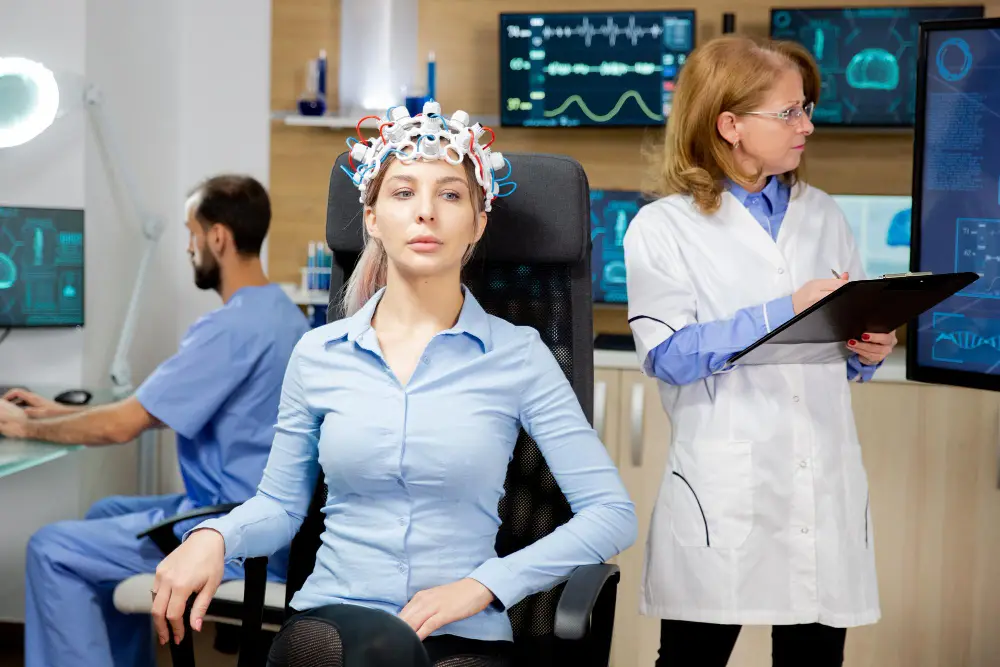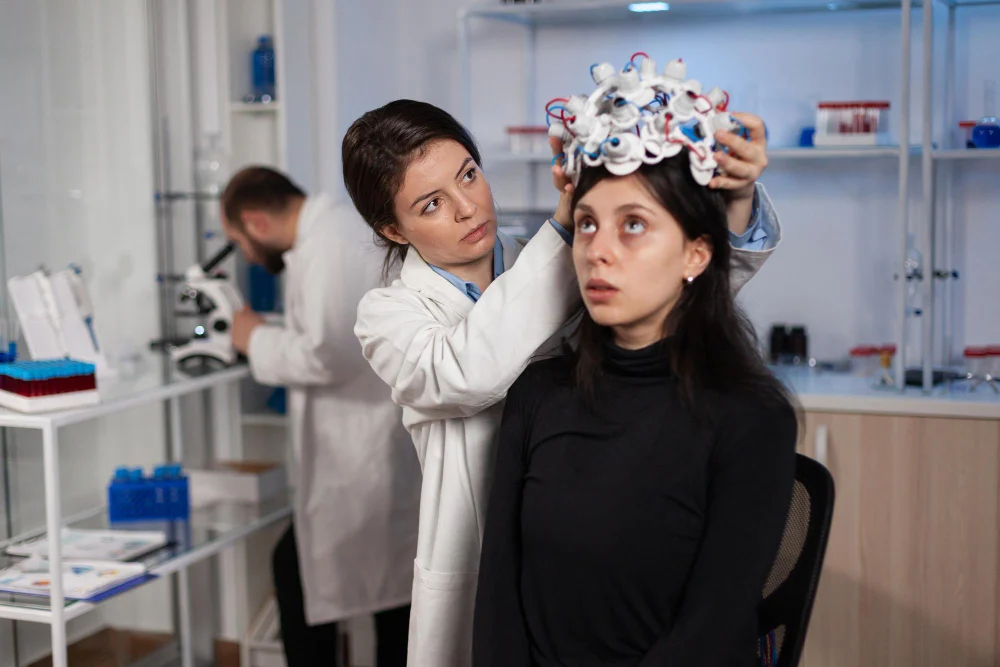Comprehensive Neurology Care for Brain and Nerve Disorders
Get advanced neurology care with experienced neurologists. Effectively restore brain and nerve function while improving overall neurological health.

Neurology
Neurology is the branch of medicine that focuses on diagnosing and treating disorders of the brain, spinal cord, nerves, and muscles. These neurological systems control everything from thought, movement, and sensation to vital body functions. When disrupted, they can lead to conditions ranging from headaches to strokes and complex neurological diseases.
At VS Hospitals, Chennai, the Department of Neurology provides comprehensive care for all types of neurological disorders. With cutting-edge diagnostic technology and a team of expert neurologists, the hospital ensures timely diagnosis, precise treatment, and compassionate care. Whether it’s managing epilepsy, Parkinson’s disease, or neurovascular emergencies, VS Hospitals delivers excellence in neurological care with a patient-first approach.

Early Detection Saves Lives
Early detection and treatment are crucial for improving the chances of survival. If you notice any concerning symptoms, consult a healthcare provider immediately.
Signs and Symptoms
Frequent Headaches or Migraines
Persistent or severe headaches can indicate underlying nerve or vascular issues.
Dizziness or Loss of Balance
Often linked to inner ear problems, brain disorders, or nerve dysfunction.
Numbness or Tingling
Loss of sensation in limbs may suggest peripheral neuropathy or nerve compression.
Muscle Weakness or Paralysis
Sudden weakness on one side of the body could be a stroke symptom.
Memory Loss or Confusion
Early indicators of Alzheimer’s disease or dementia.
Seizures or Convulsions
Characteristics of epilepsy or other neurological conditions.
Speech or Vision Problems
Trouble speaking or blurred vision may signal neurological or vascular issues.
Tremors or Involuntary Movements
Common in movement disorders like Parkinson’s disease.
Chronic Pain or Burning Sensation
Can result from nerve damage or neuropathic pain.
Difficulty Walking or Coordination Issues
Often related to cerebellar or spinal cord problems.
Loss of Consciousness
A serious warning sign of stroke, seizure, or head injury.
Blood in Urine
Hematuria - pink, red, or dark urine, the most common symptom
Frequent Urination
Feeling the need to urinate frequently, even when bladder is not full
Painful Urination
Experiencing pain or burning sensation while urinating
Back or Pelvic Pain
Pain that occurs as the cancer grows and spreads
Unexplained Weight Loss
Significant weight loss not related to diet or exercise
Fatigue
Feeling unusually tired or weak without a clear cause
Meet Our Expert Neurology Specialists
Risk Factors
Smoking
Smoking is one of the leading causes of bladder cancer. Chemicals in tobacco smoke can damage the lining of the bladder, increasing the risk.

Gender
Men are at a higher risk of developing bladder cancer than women.

Chronic Bladder Infections or Inflammation
Conditions such as bladder infections and long-term bladder inflammation can increase the risk.

Exposure to Chemicals
Prolonged exposure to certain chemicals, especially those used in the dye industry, rubber production, and chemical manufacturing, increases the risk.

Age
The risk of neurological diseases like dementia and stroke increases with aging.

Genetics
Family history of epilepsy, Parkinson’s, or Alzheimer’s heightens susceptibility.

Hypertension
High blood pressure damages brain blood vessels, leading to stroke.

Diabetes
Uncontrolled blood sugar levels can cause neuropathy and cognitive decline.

Smoking
Reduces oxygen supply to the brain and accelerates neurological degeneration.

Excessive Alcohol Consumption
Affects brain cells and can lead to memory loss and tremors.

Poor Diet
Lack of essential vitamins, especially B12, can result in nerve dysfunction.

Head Injuries
Traumatic brain injuries can cause long-term cognitive or motor issues.

Infections
Meningitis, encephalitis, or viral infections can damage nerve tissues.

Stress and Sleep Deprivation
Chronic stress and poor sleep patterns affect brain and nerve health.

Exposure to Toxins
Prolonged contact with heavy metals or chemicals can trigger neurodegenerative conditions.

Neurology
Diet and Nutrition
Prevention
Diagnosis
Key Services
Key Facilities
Food directly impacts brain and nerve health. A balanced diet can reduce inflammation, enhance cognitive function, and protect the nervous system.
Neurology Diet Recommendations:
- Omega-3 fatty acids: Found in fish, walnuts, and flaxseeds — support brain cell function.
- Antioxidants: Blueberries, spinach, and green tea fight oxidative stress.
- Vitamin B12 and Folate: Maintain healthy nerve myelin and cognitive sharpness.
- Magnesium and Zinc: Essential for nerve signaling and muscle control.
- Whole grains and lean proteins: Stabilize energy levels and improve focus.
- Avoid processed foods: Trans fats and refined sugars increase risk of cognitive decline.
- Stay hydrated: Dehydration can worsen headaches and fatigue.
The dieticians at VS Hospitals design personalized neuro-nutrition plans for patients recovering from stroke, neuropathy, or surgery ensuring faster recovery and better mental clarity.
While not all neurological disorders are preventable, healthy lifestyle habits can significantly reduce risks and slow disease progression.
Tips to Maintain Brain and Nerve Health:
- Control blood pressure and sugar levels: Prevents stroke and neuropathy.
- Exercise regularly: Boosts brain oxygen flow and cognitive performance.
- Quit smoking and alcohol: Improves nerve function and reduces brain shrinkage.
- Get adequate sleep: Vital for memory consolidation and emotional regulation.
- Eat a balanced diet: Supports brain cell repair and nerve function.
- Manage stress: Meditation, yoga, and breathing techniques protect brain chemistry.
- Protect your head: Use helmets and seatbelts to prevent traumatic injuries.
- Regular neurological check-ups: Especially if you have diabetes, hypertension, or family history.
VS Hospitals also runs preventive neurology programs focusing on early stroke detection, memory screening, and balance clinics to identify risks before major symptoms appear.
Neurological diagnosis requires precision, as many conditions share overlapping symptoms. The Neurology Department at VS Hospitals is equipped with world-class diagnostic tools that ensure accurate evaluation and tailored treatment planning.
Diagnostic Procedures Include:
- Neurological Examination: Assesses reflexes, muscle strength, coordination, and sensory response.
- MRI (Magnetic Resonance Imaging): Detects brain and spinal cord tumors, strokes, or lesions.
- CT Scan (Computed Tomography): Identifies hemorrhages, fractures, and trauma-related injuries.
- EEG (Electroencephalogram): Records brain activity to diagnose epilepsy and seizure disorders.
- EMG and Nerve Conduction Studies: Measure muscle and nerve electrical activity to detect neuropathies.
- Lumbar Puncture (Spinal Tap): Analyzes cerebrospinal fluid for infections or autoimmune diseases.
- Carotid Doppler and Brain Angiography: Evaluate brain blood flow for stroke assessment.
- Evoked Potentials Test: Measures brain response to sensory stimuli for multiple sclerosis diagnosis.
- Neuropsychological Testing: Assesses memory, attention, and cognitive functions in dementia.
- Blood Tests: Detect metabolic disorders, infections, or deficiencies affecting nerve function.
The neurology specialists at VS Hospitals analyze each test result comprehensively to design a customized care plan that addresses both the cause and symptoms effectively.
The Neurology Department at VS Hospitals offers advanced care for a wide range of neurological and neurosurgical conditions, integrating medicine, technology, and rehabilitation. The hospital’s multidisciplinary approach ensures optimal outcomes for both acute and chronic neurological disorders.
Comprehensive Neurological Services Include:
- Stroke Management & Rehabilitation: 24/7 emergency care, clot-busting therapy, and personalized recovery programs.
- Epilepsy & Movement Disorder Care: Advanced EEG monitoring, medication, and surgical options including deep brain stimulation (DBS).
- Headache, Migraine & Sleep Clinics: Specialized therapies for chronic headaches, insomnia, and sleep apnea.
- Dementia, Alzheimer’s & MS Treatment: Early diagnosis, cognitive therapy, immunotherapy, and lifestyle management.
- Neuropathy, Pain & Spasticity Management: Comprehensive care with physiotherapy, medications, and Botox therapy.
- Neurocritical & Rehabilitation Services: Intensive care for neurological emergencies and recovery-focused rehabilitation programs.
At VS Hospitals, each patient receives personalized neurological care with an emphasis on recovery, independence, and quality of life.
VS Hospitals, Chennai, is equipped with state-of-the-art infrastructure designed to provide advanced neurological care and patient safety.
Top Facilities Include:
- Advanced Neuro-Imaging Suites: Equipped with MRI, CT, and PET scans for precise brain and spine imaging.
- Neurophysiology & Epilepsy Monitoring Labs: EEG, EMG, and long-term seizure evaluations under expert supervision.
- Dedicated Stroke & Neuro-ICU Units: 24/7 emergency stroke care and intensive monitoring for critical neurological cases.
- Neuro-Surgical & Navigation Systems: Advanced microsurgical tools ensuring precision in brain and spine surgeries.
- Rehabilitation & Physiotherapy Center: Personalized programs to restore movement, balance, and speech after neurological injury.
- Comprehensive Patient Support: Includes tele-neurology, counseling, in-house lab, pharmacy, and trauma services for complete care
These facilities make VS Hospitals one of the most trusted neurological centers in Tamil Nadu, known for combining advanced medical science with compassionate patient care.
Top Medical Facilities at Our Multispeciality Hospital – Here’s What Makes Us Different!
Ready to Begin Your Neurology Care Journey? – Expert Brain and Nerve Care
Learn More About Neurology Treatments and Procedures
Frequently Asked Questions
VS Hospitals provides complete neurological care for stroke, epilepsy, migraines, Parkinson’s disease, neuropathy, multiple sclerosis, and dementia. The hospital’s expert neurologists use advanced diagnostic and treatment technologies for effective, long-term outcomes.
Yes. VS Hospitals has a dedicated 24/7 Neurology Emergency Unit with rapid-response stroke management, seizure control, and advanced neurocritical care. Early treatment ensures better recovery and minimizes brain damage in emergencies.
VS Hospitals combines expert neurologists, advanced neuro-imaging, and personalized care plans under one roof. With specialized units for stroke, epilepsy, and neuro-rehabilitation, it provides comprehensive, world-class neurological care for patients of all ages.



